The Bible's teachings on gender equality and the roles of women have been subjects of considerable discussion and reflection. This conversation draws from a rich tapestry of scriptural narratives, historical contexts, and theological interpretations, aiming to shed light on how these ancient texts inform our understanding today. As we examine the roles that women have played in biblical history and the profound implications of these roles for contemporary faith communities, we navigate a path that seeks to balance tradition with progressive insights.
Biblical Equality
The Bible sets a profound groundwork on the equality of men and women, encapsulated in Genesis 1:27, asserting, "God created man in His own image, in the image of God He created him; male and female He created them." This verse underscores the shared divine imprint on both genders, laying the foundation for their inherent worth and dignity.
Galatians 3:28 offers an even more expansive view on equality, stating, "There is neither Jew nor Greek, slave nor free, male nor female, for you are all one in Christ Jesus." This declaration indicates that in matters of faith, salvation, and spiritual standing, men and women stand on equal footing, breaking down barriers that the world often puts up.
When looking at the roles and value of women throughout the Bible, there are many examples demonstrating their crucial involvement in God's plans. Women such as Deborah, serving as a judge and leader in Israel (Judges 4), and Priscilla, involved in early church ministries (Acts 18:26), showcase their capability and God's endorsement of women in pivotal roles.
In the accounts of Jesus' interactions with women, the Gospels portray His revolutionary approach that elevated women's status and affirmed their value. Jesus broke social norms by speaking openly with women, like the Samaritan woman at the well (John 4), and He honored the faith of women, like the woman who touched His garment for healing (Mark 5:34).
The Bible also highlights the consequences of societal norms that undermined women's equality. Instances of injustice and gender disparities found in scripture are not endorsements of those conditions but rather reflections of humanity's moral failings. These narratives encourage believers to seek justice and uphold dignity for all.
Reflecting on these insights from Genesis and Galatians amidst the broader biblical narrative illustrates that both men and women hold irreplaceable value in God's eyes. Their distinction doesn't establish a hierarchy of worth but affirms the complementary roles designed by God, aiming for harmony and mutual respect in the church and broader society.
Such biblical understanding invites us to appreciate and advocate for the equality and affirmation of both men and women as God's image bearers, crucial for enriching families, communities, and congregations. Believers are challenged to recognize and nurture the unique gifts and callings God has placed in every individual, regardless of gender, fostering an environment where all can thrive in fulfilling their divine purpose.
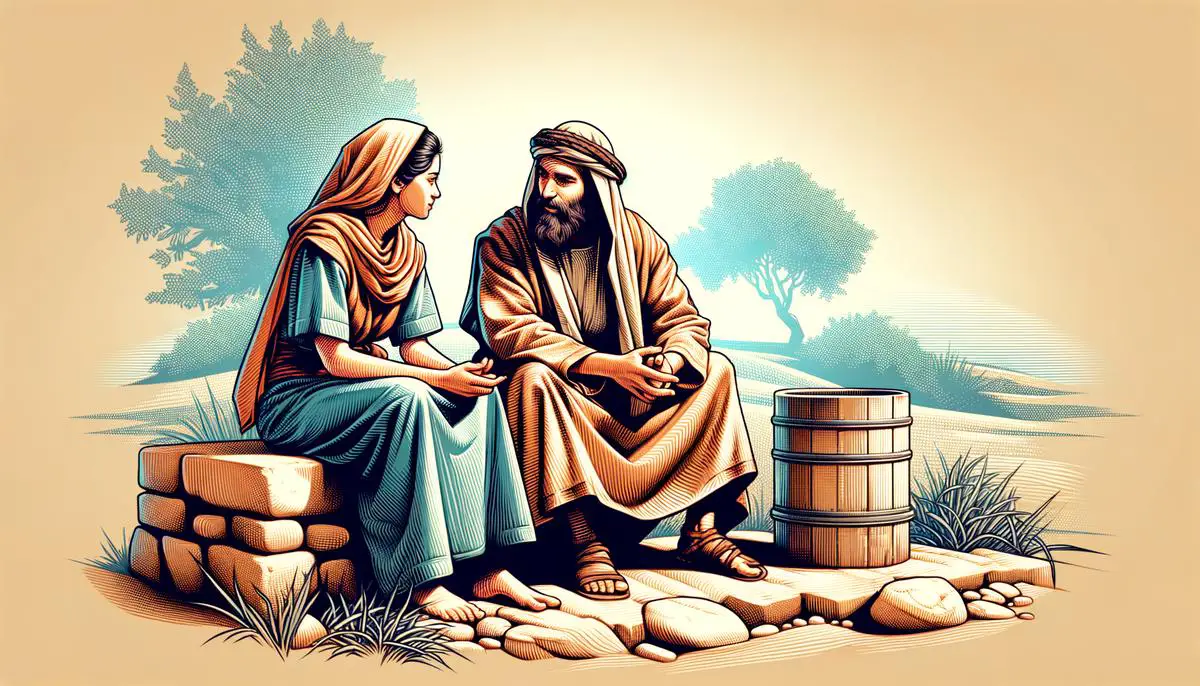
Women’s Roles
Women's Roles in the Bible: Leadership, Prophecy, and Ministry
The Bible reveals an overarching narrative filled with diverse characters, each playing pivotal roles in God's redemptive story. Among these figures, women emerge powerfully, embodying leadership, prophecy, and ministry. Their stories provide profound insights into God's design for women's roles, transcending mere cultural limitations of their times.
Deborah stands as a beacon of leadership in the ancient world, a realm predominantly dominated by men. As a judge over Israel (Judges 4), her role was multifaceted; she served not only as a legal authority but also as a military leader, delivering Israel from the oppression of Jabin, the king of Canaan. Her story challenges misconceptions of passivity or secondary status assigned to women in leadership within Scripture. Deborah's leadership was God-ordained, showcasing wisdom and courage, irrespective of gender.
Esther's tale unfolds within the palace walls, positioning her as an unlikely heroine who risked everything for her people's salvation. Her story in the Book of Esther exemplifies boldness and strategic wisdom. Amidst a hostile environment, Esther navigated complex sociopolitical realms to overturn a decree that threatened her entire community. Her profound reliance on faith and astute acumen suggests that leadership, coupled with divine purpose, empowers individuals to effect remarkable change, emphasizing that women's roles in leadership are not just permissible but pivotal in fulfilling God's plan.
The ministry and service of women in the early Church are captured in the staunch loyalty and assistance of Phoebe (Romans 16:1). Described as a deaconess of the church at Cenchreae, her role was instrumental in aiding Paul and many others. Her commendation by Paul further amplifies the respect and recognition women received in early Christian ministry. Phoebe embodies the servant leadership that Christ exemplified, illustrating that ministry is not bound by gender but by faithfulness and dedication to serving the body of Christ.
Female prophets such as the daughters of Philip, who prophesied (Acts 21:9), echo the Old Testament tradition of women with prophetic gifts. Their inclusion signifies a continuum in God's use of women as vital communicators of His divine will. It reiterates that spiritual gifts are poured out on all flesh, aligning with the promise of an egalitarian outpouring of the Spirit in the last days (Joel 2:28-29, Acts 2:17-18).
The roles played by Deborah, Esther, Phoebe, and others, provide a glimpse into how women's contributions have significantly shaped the biblical narrative. Their stories challenge preconceived notions about gender roles within both religious and societal contexts.
These exemplary women encourage an inclusive interpretation of Scriptures. Acknowledging their leadership, ministries, and prophecies prompts a broader dialogue centered on equality in service and leadership. This approach demands a reevaluation of traditional views, appreciating that the divine calling extends beyond gender limits, championing a vision where all believers, irrespective of gender, can wholly contribute to the Kingdom of God.
Embracing women's roles as depicted in biblical narratives propels us towards a fuller understanding of God's kingdom, one wherein every individual's contribution is valued and vital. As believers striving to mirror God's inclusivity and grace, recognizing and empowering the diverse callings within our midst becomes an imperative in nurturing a vibrant, dynamic faith community today.
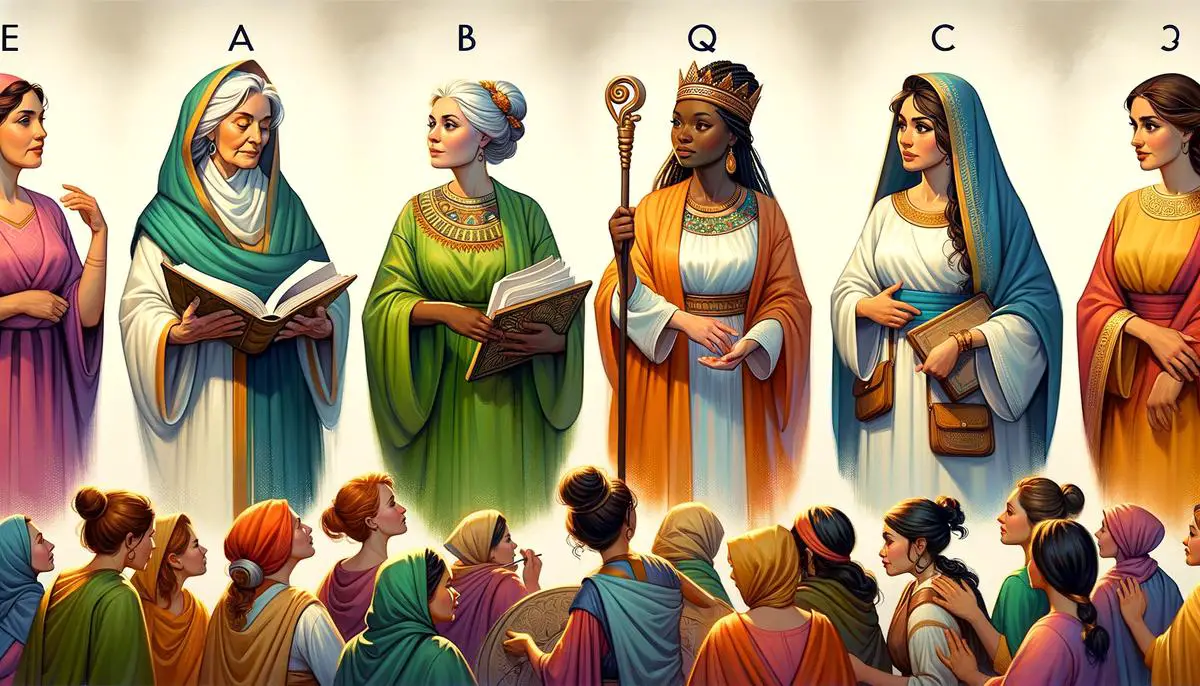
Egalitarianism vs. Complementarianism
Understanding the Egalitarian and Complementarian Perspectives
The dialogue concerning women's roles within Christianity hinges heavily on two primary theological frameworks: egalitarianism and complementarianism. Both viewpoints delve into Scripture for guidance, yet they arrive at distinct interpretations concerning women's roles in the church and family. A closer examination of these perspectives sheds light on their hermeneutical approaches and highlights the diverse ways believers understand God's Word in relation to gender roles.
Egalitarianism champions the belief that men and women are created equal in all aspects, including authority and roles within both the church and the household. Egalitarians argue that any differences seen in Scriptural commands are culturally contextual and not prescriptive for all of Christianity. For instance, passages that appear to limit women's roles in the church, such as 1 Timothy 2:12, are interpreted in light of historical and cultural situations rather than as timeless mandates. Central to this viewpoint is the assertion that any distinctions made between men and women's roles were a result of the Fall, and Christ's redemptive work aims to restore the original equality evident at Creation. Galatians 3:28 serves as a cornerstone verse for egalitarians, underscoring the unity and equality in Christ that transcends gender, ethnic, and socioeconomic distinctions.
Complementarians hold to a nuanced acknowledgment of gender equality, stressing that while men and women share equal value and worth before God, they have distinct roles that complement each other within the church and the family. This standpoint maintains that such differences in role and function are not a result of sin but are rooted in creation itself. Key texts supporting this view include Ephesians 5:22-33, where the marriage relationship mirrors Christ's relationship with the church, and 1 Timothy 2:11-14, where Paul grounds his instructions in the created order and the fall. Complementarians assert that these role distinctions are a part of God's divine order, offering a framework through which each gender can fully express their God-given identity.
The complementarian perspective often emphasizes headship in the context of marriage – viewing the husband as the head of the wife as Christ is the head of the church – and leadership within the church, typically reserving pastoral roles and authoritative teaching positions for men. Yet, responsible complementarianism condemns any abuse of authority and advocates for loving leadership that seeks the flourishing of all individuals.
On the egalitarian side, there is a robust engagement with possibilities for ministry without gender-based restrictions. Women are encouraged to serve in any leadership capacity for which they are gifted and called, including pastoral positions. This interpretation springs from a conviction that the empowerment of the Holy Spirit for ministry is not gender-specific.
While these interpretative lenses diverge on matters of application, both views seek fidelity to Scripture's teachings and a desire to live out Christian principles authentically. The differences between egalitarianism and complementarianism highlight the breadth of interpretation within Christian theology concerning the roles of men and women. This discussion continues to be an area of vibrant dialogue within the church, fostering deeper engagement with Scripture and a more nuanced understanding of our faith tradition's diverse expressions.
In navigating these complex discussions, it's essential to approach them with grace, understanding, and a shared commitment to discerning God's will together as one body in Christ. Whether one leans toward an egalitarian or complementarian viewpoint, the ultimate goal remains to live out our callings in a manner that glorifies God, edifies the church, and reflects the kingdom principles of justice, love, and service to all.
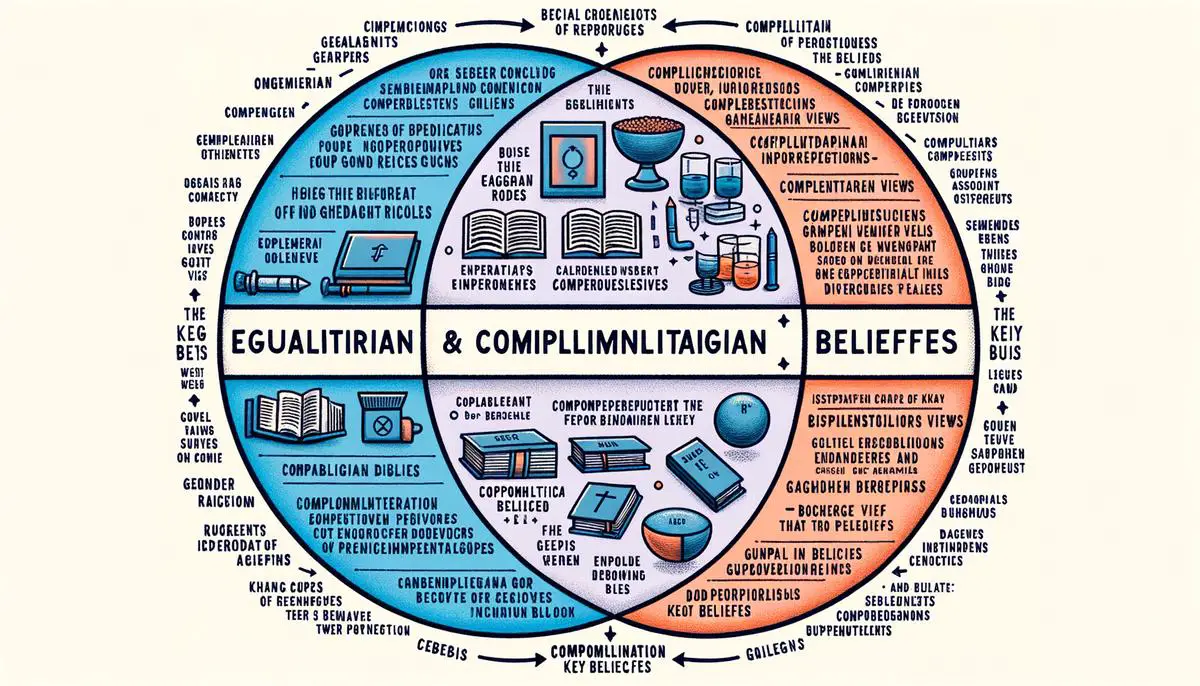
Women and Redemption
Redemption in Christ: An Equal Hope for Women
The Gospel message unfolds a radical narrative of redemption. Central to this is the person of Jesus Christ, through whom reconciliation between humanity and God is made possible. One of the most profound aspects of this redemption is its inclusive scope—a truth that holds particular resonance when considering the implications for women within scriptural teachings. Through the redemptive work of Christ, women are afforded equal access to salvation, embodying the promise of new life irrespective of gender distinctions.
Scriptures, such as 1 Peter 3:7 and Galatians 3:28, underscore this inclusivity. In 1 Peter 3:7, Peter speaks to husbands, highlighting the necessity of honoring one's wife "as the weaker partner and as heirs with you of the gracious gift of life," reaffirming that both men and women are co-heirs in Christ's salvific promise. It is a reminder of the mutual respect and honor due to both genders, rooted in their shared inheritance of eternal life.
Galatians 3:28 further expounds on the equality wrought by Christ's redemption, stating, "There is neither Jew nor Greek, slave nor free, male nor female, for you are all one in Christ Jesus." This declaration from Paul shatters the societal and religious barriers that once delineated and distinguished individuals. Instead, it proclaims a new unity and identity found in Christ—one where gender does not predicate one's access to divine grace or spiritual efficacy.
The implications of this for women are vast and encouraging. Historically marginalized or relegated to the peripheries of religious and social settings, women, through Christ's redemptive work, are invited into the heart of God's kingdom with no reservation or distinction. They are called to participate in the fullness of spiritual life, resourced and empowered by the same Spirit that raised Christ from the dead.
Redemption in Christ redefines value and worth, attributing it equally to both men and women. It offers a renewal of identity that prevails over any societal labels or limitations, proclaiming that in Christ, women are fully seen, known, and loved. Through redemption, women are affirmed in their God-given dignity, invited to partake in divine mission, and empowered to utilize their spiritual gifts for the edification of the church and the broader community.
The New Testament abounds with examples of this transforming redemption in the lives of women. Mary Magdalene, who was first to witness the resurrected Christ and announce this news to the disciples, exemplifies the pivotal role women play in forwarding the narrative of redemption (John 20:1-18). Similarly, the account of Lydia's conversion (Acts 16:14-15) illustrates the early church's embrace of redeemed women as vital contributors to the faith community.
In exploring these teachings and narratives, it becomes clear how deeply the New Testament contests gender-based exclusions from spiritual life and ministry. Redemption in Christ initiates a radical equalization, dissolving the barriers that divide and reconstructing a community founded on divine love and grace. Thus, for women, redemption signifies not only a personal salvation and renewal but also an open invitation to active participation in God's redemptive work on earth — an essence of total inclusivity that lies at the heart of the Gospel.
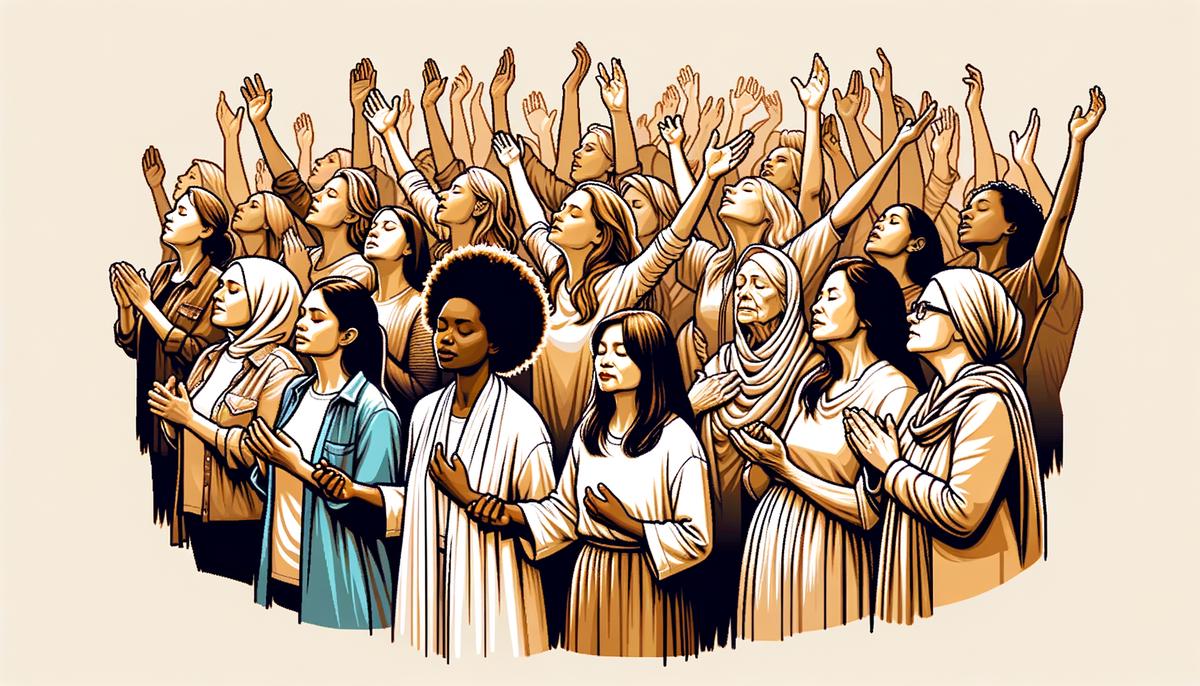
Cultural Context
The cultural context of biblical times significantly influenced women's roles and their portrayal in the Bible. The ancient civilizations in which the biblical narrative is set were predominantly patriarchal, with men at the helm of religious, political, and economic life. Women's roles were largely confined to the domestic sphere, as reflected in passages such as Proverbs 31 and the laws found in Leviticus concerning purity and family.
However, the Bible also features stories of women who broke through societal boundaries, such as Ruth and Esther. These women navigated their way through socio-political landscapes with bravery, wisdom, and faith, achieving roles pivotal to Israel's story and humanity's redemptive history. The Gospels further disrupt contemporary gender norms, depicting Jesus engaging with women as disciples, witnesses, and leaders in revolutionary ways.
Understanding the historical and cultural context is crucial when interpreting biblical texts about women today. Without this comprehension, there's a risk of importing ancient norms into modern interpretations without appreciating the transformative potential within scripture. Acknowledging the specific historical and cultural milieu in which biblical texts were written helps us distill universal principles from culturally contingent prescriptions.
Moreover, exploring cultural context illuminates scripture's progressive trajectory concerning gender equality. While certain passages reflect their era's limitations, others shatter these constraints, pointing to a Kingdom ethos where "there is neither male nor female" (Galatians 3:28). This perspective encourages believers to disentangle eternal truths from temporal cultural constructs, fostering a more inclusive understanding of spiritual vocations beyond gender.
Scholars, theologians, and pastors who explore the cultural contexts of the Bible enrich our comprehension and bridge gaps between ancient ideology and contemporary faith application. They invite us into a nuanced conversation wherein women's biblical roles are seen not as rigid norms but as part of a broader divine narrative celebrating redemption, equality, and empowerment.
By navigating the cultural waters of biblical interpretation, we learn to honor the text's historical sanctity while embracing its present-day implications. In doing so, we continue to unfold the wisdom of the Scriptures, ensuring that understanding and reverence for all individuals, regardless of gender, are woven into the fabric of our faith communities.
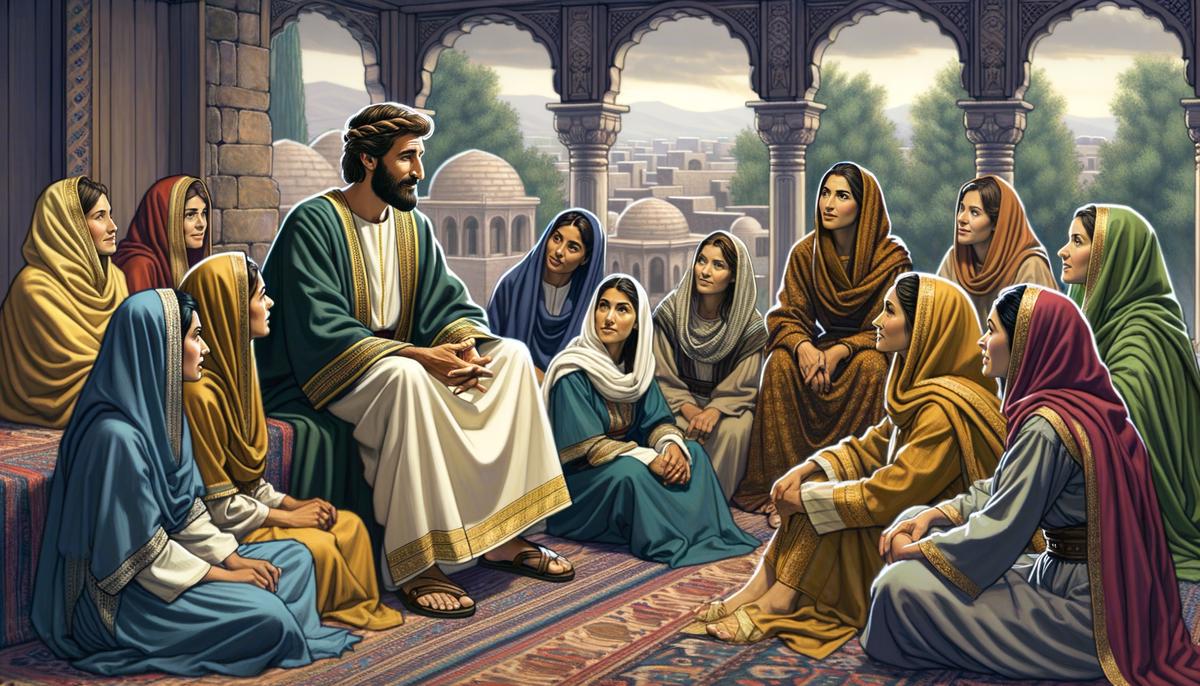
The central message of gender equality and the valued roles of women throughout biblical narratives stand as a testament to the inherent worth and dignity bestowed upon all individuals, regardless of gender. This principle, deeply embedded within scripture, challenges us to foster communities where every person is recognized and celebrated for their contributions to our collective spiritual journey.
It is a call to action, urging us to embrace and advocate for a world where equality prevails, reflecting the divine image in every individual. As stated in Genesis 1:27, "God created mankind in his own image, in the image of God he created them; male and female he created them."1 This foundational truth underscores the importance of valuing and upholding the dignity of all people, irrespective of gender.

